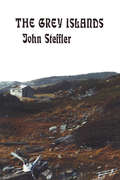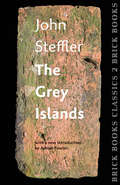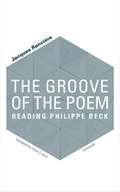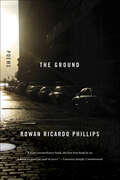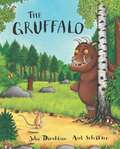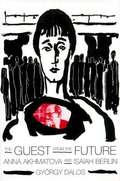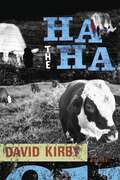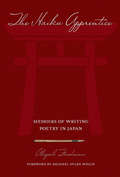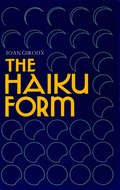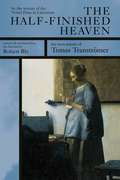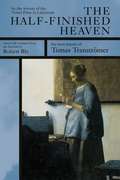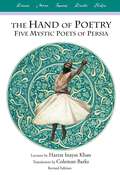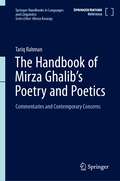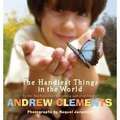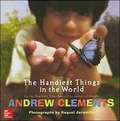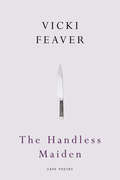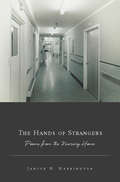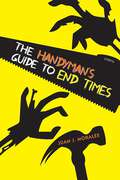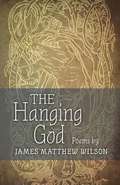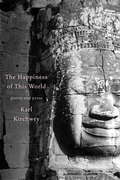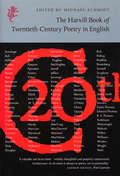- Table View
- List View
The Grey Islands
by John StefflerSince its first publication in 1985, The Grey Islands has become a classic of Canadian wilderness writing to set beside the works of Thoreau, Annie Dillard and Aldo Leopold. Using a broad range of forms and styles – lyric, anecdote, field notes, documents and pseudo-documents, ghost story, tall tale – Steffler relates the story of one man’s pilgrimage to a remote island of Newfoundland’s northern peninsula. Often comic, and always deeply passionate and sensuous, The Grey Islands tells of the sharpening of perceptions whetted by solitude, wind and rock, and of the pilgrim’s people – living and dead – who have striven to exist under its harsh regime. As in his other books, like That Night We Were Ravenous or his acclaimed novel The Afterlife of George Cartwright, Steffler’s writing delivers the bite of raw experience and embraces existence at the edge in all its terror and beauty.
The Grey Islands
by John StefflerDeluxe redesign of a seminal book by Canada’s former Parliamentary Poet Laureate.Includes new material. On the occasion of the press's 40th anniversary, Brick Books is proud to present the second of six new editions of classic books from our back catalogue. This new edition of The Grey Islands features a foreword by scholar Adrian Fowler and a detailed and insightful look back at the book and the time of its inception by Steffler himself. Featuring a new cover and design by the renowned typographer Robert Bringhurst. The Grey Islands is the story of one man’s pilgrimage to a remote island of Newfoundland’s northern peninsula. Using a broad range of styles, The Grey Islands delivers the bite of raw experience and embraces existence at the edge in all its terror and beauty.
The Groove of the Poem: Reading Philippe Beck (Univocal)
by Jacques Rancière&“Music is the brute that shows. It is the avowal of materials, And stutters between its clanging of things.&”How should one think this musical groove of the poem whose back and forth motion shuffles the material of ordinary language and revives the frozen speech of old chants? This question by renowned French thinker Jacques Rancière is the entry point for his earnest and careful reading of one of France&’s most singular and important contemporary poets. For Rancière, Philippe Beck sets himself the task of a poetry after poetry whereby Beck re-writes and transforms the poems of the past, reanimating faded genres, poetizing the prose of popular tales and even commentaries regarding poems. To read and follow this groove traced as such cannot simply be done by way of taking the poems as objects of study. It supposes a dialogue regarding what these poems attempt to do as well as an idea of a poetry which serves as their foundation. This book on Philippe Beck is thus also a book made with him.
The Ground: Poems
by Rowan Ricardo PhillipsA masterful debut from a powerfully original poetic voiceA poignant and terse vision of New York City unfolds in Rowan Ricardo Phillips's debut book of poetry. A work of rare beauty and lyric grace, The Ground is an entire world, drawn and revealed through contemplation of the post-9/11 landscape. With musicality and precision of thought, Phillips's poems limn the troubadour's journey in an increasingly surreal modern world ("I plugged my poem into a manhole cover/That flamed into the first guitar"). The origin of mankind, the origin of the self, the self's development in the sensuous world, and––in both a literal and figurative sense––the end of all things sing through Phillips's supple and idiosyncratic poems. The poet's subtle formal sophistication—somewhere between flair and restraint—and sense of lyric possibility bring together the hard glint of the contemporary world and the eroded permanence of the archaic one through remixes, underground sessions, Spenserian stanzas, myths and revamped translations. These are poems of fiery intelligence, inescapable music and metaphysical splendor that concern themselves with lived life and the life of the imagination––both equally vivid and true––as they lay the framework for Phillips's meditations on our connection to and estrangement from the natural world.
The Gruffalo
by Julia DonaldsonA mouse is taking a stroll through the deep, dark wood when along comes a hungry fox, then an owl, and then a snake. Mouse outwits them by talking about his friend, the gruffalo, a creature with terrible claws, and terrible tusks in its terrible jaws, and knobbly knees and turned-out toes, and a poisonous wart at the end of its nose. Of course, there's no such thing as a gruffalo... or is there?
The Guest from the Future: Anna Akhmatova and Isaiah Berlin
by Gyorgy Dalo Andrea Dunai Antony WoodIn 1945 Berlin, Russian-born Oxford professor & first secretary for the British Embassy in Moscow, visited Russian poet Akhmatova. She saw him as a visitor from the democratic world that she'd never experienced. The KGB saw him as a British spy. The book deals with the interesting relationship between these extraordinary individuals as well as the history of Russia before and after communism, especially just after World War II.
The Ha-ha: Poems (Southern Messenger Poets)
by Professor David KirbyA feature of English landscape architecture, a ha-ha is a wall at the bottom of a ditch; its purpose is to allow the presence of cows and sheep on one's lawn, but at an agreeable distance and with none of the malodorous unsightliness that proximity would bring. Similarly, The Ha-Ha, the latest offering from poet David Kirby, is both an exploration of the ways in which the mind invites chaos yet keeps it at a distance and an apologia for humor, reflecting Irish poet Patrick Kavanagh's observation that tragedy is merely underdeveloped comedy. Embracing wit, wide-ranging scholarship, and an equal love of travel as well as the pleasures of home, The Ha-Ha depicts comedy as a radical form of intelligence, a way of thinking that just happens to be noisy and rumbustious.We are staying with Barbara's parents on Oahu, and the first night we're there, I notice an angry-looking man is staring at meout of the neighbor's upstairs window and mumbling something, but the second night I realize that it's that poster of Bo Diddleyfrom the famous Port Arthur concert, and there's a phone wirein front of his face that bobs up and down when the trade winds blow,which they do constantly, making it seem as though Mr. Diddley is saying something to me.From "The Ha-Ha, Part I: The Tao of Bo Diddley" published in The Ha-Ha: Poems by David Kirby. Copyright © 2003 by David Kirby. All rights reserved. - See more at: http://lsupress.org/books/detail/the-ha-ha/#sthash.g8vUSeuN.dpuf
The Haiku Apprentice
by Abigail Friedman Michael Dylan WelchThe problem came to a head one day as I was driving through Tokyo. While waiting for the light to change, I saw the following public service announcement on the side of a bus: Omoiyari hitonikurumani konomachini (Sympathy / toward people, toward cars / toward this town). Seventeen syllables. Five-seven-five format. It must be a haiku, I thought. But when I reached the office and repeated the announcement to my Japanese coworkers, none of them thought it was a haiku. I knew they were thinking to themselves, What kind of a lunatic is she? One tried to break the news to me gently, It's not a haiku, it's an advertising jingle. Well, I knew it was an advertising jingle, but still, wasn't it an advertising jingle haiku?--From The Haiku ApprenticeAbigail Friedman was an American diplomat in Tokyo, not a writer. A chance encounter leads her to a haiku group, where she discovers poetry that anyone can enjoy writing. Her teacher and fellow haiku group members instruct her in seasonal flora and fauna, and gradually she learns to describe the world in plain words, becoming one of the millions in Japan who lead a haiku life. This is the author's story of her literary and cultural voyage, and more: it is an invitation to readers to form their own neighborhood haiku groups and, like her, learn to see the world anew."...A deft and seamless merging of genres: at once memoir, travel literature, and an unpretentious guide onto the terrain of Japanese poetry. It will appeal not just to poetry lovers, but to all readers who are curious about the world beyond their own borders." -- Foreword Magazine"Friedman is an appealing guide through an alternate Japan where modern people make poems about teacups and temples but also about skyscrapers and kidney surgery." -- East Bay Express"The book is not designed to make the reader a poet, but it does, perhaps, help us to pay more attention to our poetical eye." -- BiblioBuffet"The Haiku Apprentice gives the reader an original, thoughtful and personal glimpse of one expat's productive encounter with Japan." -- Metropolis "...Notable for its frankness and enthusiasm...Friedman has made a lively narrative out of the things she learned..." -- The Japan Times
The Haiku Form
by Joan GirouxThis book, the first of its kind, examines English-language haiku in the light of the Japanese form. Author Joan Giroux explicates the meaning and history of the Japanese haiku, its cultural background, the creative process which gives it birth and the technical devices developed by Japanese poets over the centuries. Examples by classic and contemporary poets, including Basho and Buson, Shiki and Hatsutaro, are given in romanized Japanese and in English translation. Poems in English, from early efforts by Ezra Pound and Wallace Stevens to the work of contemporaries like James Hackett, are discussed and evaluated. Wherever possible, comparisons are made, contrasts indicated and suggestions given, with a rare sensitivity to the poetic possibilities of both languages and a keen appreciation of the unique qualities of both cultures.The author, after more than a decade of study, foresees the emergence of "a great haiku poet who will take the Japanese form and give it the truly English shape that is waiting for it." Before that can happen, she points out, poets must seek a thorough knowledge of the Japanese language, as well as Japanese culture and poetics. This book enables English-speaking poets and students of haiku to take the essential first steps to such knowledge.
The Haiku Form
by Joan GirouxThis book, the first of its kind, examines English-language haiku in the light of the Japanese form. Author Joan Giroux explicates the meaning and history of the Japanese haiku, its cultural background, the creative process which gives it birth and the technical devices developed by Japanese poets over the centuries. Examples by classic and contemporary poets, including Basho and Buson, Shiki and Hatsutaro, are given in romanized Japanese and in English translation. Poems in English, from early efforts by Ezra Pound and Wallace Stevens to the work of contemporaries like James Hackett, are discussed and evaluated. Wherever possible, comparisons are made, contrasts indicated and suggestions given, with a rare sensitivity to the poetic possibilities of both languages and a keen appreciation of the unique qualities of both cultures.The author, after more than a decade of study, foresees the emergence of "a great haiku poet who will take the Japanese form and give it the truly English shape that is waiting for it." Before that can happen, she points out, poets must seek a thorough knowledge of the Japanese language, as well as Japanese culture and poetics. This book enables English-speaking poets and students of haiku to take the essential first steps to such knowledge.
The Haiku Form
by Joan GirouxThis classic book is a collection and analysis of Japanese haiku in the English language.The Haiku is a brief poetic form expressing a moment of insight. No foreign form since the sonnet has so fascinated and challenged the poets of the English-speaking world. Yet no scholar or critic, until now, has undertaken a definitive study of the problems of writing haiku in English.This book, the first of its kind, examines English language haiku in the light of Japanese form. Author Joan Giroux explicates the meaning and history of the Japanese haiku, its cultural background the creative process which gives it birth and the technical devices developed by Japanese poets over the centuries. Examples by classic and contemporary poets, including Basho and Buson, Shiki and Hastutaro, are given Romanized Japanese and in English translation. Poems, in English, from early efforts by Ezra Pound and Wallace Stevens to work of contemporaries like James Hackett, are discussed and evaluated. Wherever possible, comparisons are made, contrast indicated and suggestions given, with a rare sensitivity to the poetic possibilities of both languages and keen appreciation of the unique qualities of both cultures.
The Half-Finished Heaven: Selected Poems
by Tomas TranstromerFrom the Winner of the 2011 Nobel Prize in LiteratureThe contemporary Swedish poet Tomas Tranströmer is a recipient of the Nobel Prize in Literature and has a prestigious worldwide reputation. Robert Bly, a longtime friend and confidant of Tranströmer's, as well as one of his first translators, has carefully chosen and translated the finest of Tranströmer's poems to create this cherished and invaluable collection.ContentsIntroduction: "Upward into the Depths" by Robert Bly1From17 Poems (1954)Secrets on the Road (1958)The Half-Finished Heaven (1962)Evening—MorningStormThe Man Awakened by a Song above His RoofTrackKyrieAfter the AttackBalakirev's Dream (1905)The CoupleAllegroLamentoThe Tree and the SkyA Winter NightDark Shape SwimmingThe Half-Finished HeavenNocturne2FromResonance and Footprints (1966)Night Vision (1970)Open and Closed SpaceFrom an African DiaryMorning Bird SongsSummer GrassAbout HistoryAfter a DeathUnder PressureSlow MusicOut in the OpenSolitudeBreathing Space JulyThe Open Windows26PreludesThe BookcaseOutskirtsGoing with the CurrentTrafficNight DutyA Few MomentsThe NameStanding Up3FromPathways (1973)Truth Barriers (1978)ElegyThe Scattered CongregationSnow-Melting Time, '66Further InLate MayDecember Evening, '72Seeing through the GroundGuard DutyAlong the Lines (Far North)At Funchal (Island of Madeira)Calling HomeCitoyensFor Mats and LailaAfter a Long Dry SpellA Place in the WoodsStreet CrossingBelow FreezingStart of a Late Autumn NovelFrom the Winter of 1947The ClearingSchubertiana4FromThe Wild Market Square (1983)For the Living and the Dead (1989)Grief Gondola (1996)From March '79Fire ScriptBlack PostcardsRomanesque ArchesThe Forgotten CommanderVermeerThe CuckooThe Kingdom of UncertaintyThree StanzasTwo CitiesIsland Life, 1860April and SilenceGrief Gondola #2
The Half-Finished Heaven: The Best Poems of Tomas Transtromer
by Robert Bly Tomas TranstromerRobert Bly, a longtime friend and confidant of Transtromer's, as well as one of his first translators, has carefully chosen and translated the finest of Transtromer's poems to create this cherished and invaluable collection.
The Hand of Poetry: Five Mystic Poets of Persia
by Hazrat Inayat Khan, Coleman BarksThe Hand of Poetry offers entrance into the world of beauty and truth. Five lectures on Persian poetry given by Pir-o-Murshid Inayat Khan in San Francisco in 1923 are followed by fresh translations by the poet Coleman Barks of some of the poetry Inayat Khan discusses, including pieces from Sanai, Attar, Rumi, Saadi and Hafiz. Coleman Barks is a renowned poet and the bestselling author of The Essential Rumi, The Soul of Rumi and Rumi: The Book of Love. He was prominently featured in both of Bill Moyers's PBS television series on poetry, "The Language of Life" and "Fooling with Words." He taught English and poetry at the University of Georgia for thirty years, and now focuses on writing, reading, and performances. "It is always wonderful to taste the fruit of these masters, and both Inayat Khan and Coleman Barks make their wisdom and delights more accessible to us." --Llewellyn Vaughn-Lee "What the Sufis and the Dervishes have sought for in the past is the same as that which all true seekers after Truth yearn for now in their own hearts. The message for our time is the same message that was given to us by these great mystic poets, who wrote so long ago. It is the message of Freedom."--Reshad Field
The Handbook of Mirza Ghalib's Poetry and Poetics: Commentaries and Contemporary Concerns (Springer Handbooks in Languages and Linguistics)
by Tariq RahmanThe Handbook of Mirza Ghalib's Poetry and Poetics: Commentaries and Contemporary Concerns is a seminal contribution to Ghalib studies. It provides a detailed commentary in English on the poetry of Mirza Asadullah Khan Ghalib, known as Ghalib (1797-1869), arguably the greatest poet of Urdu not only of the 19th century, when he lived, but of all time. Each couplet is explained in English and is underpinned by historical references. Each chapter is rigorous, thorough, and jargon-free, making it accessible to all readers. The commentary relates to the historical reality of Ghalib's time as well as the contemporary period. It quotes several couplets from Urdu, Punjabi and English literature as well as other significant texts that have influenced civilisations, such as the Bible, the Quran, Dhammapada, Bhagwat Gita, Plato, and so on. It touches upon cultural history, too. Ghalib's commentaries - rich in cultural, historical, and literary references - make his work relevant to a wide range of contemporary concerns. The book is a social and literary guide to Indo-Islamicate culture, Iranian pre-Islamic cultural influences and local folk Indian Islam. The Urdu text of Ghalib and poetry in the literary languages of South Asia -- Persian, Urdu and Punjabi -- are transliterated according to a list of symbols that maintain accuracy and accessibility. The book introduces the reader not only to Ghalib's couplets but also to the most famous form of Islamicate poetry, the ghazal, found in Arabic, Persian, Turkish and Urdu literary traditions. In turn, it provides an alternative lens to understanding Islam and its interdisciplinary connections within the fields of international relations, politics, and sociology.
The Handiest Things in the World
by Andrew ClementsThis book showcases the importance of hands in our life and how to utilize them in such a way as to keep them clean.
The Handiest Things in the World (Elementary Core Reading)
by Andrew ClementsNIMAC-sourced textbook
The Handless Maiden
by Vicki FeaverThe poems in this extraordinary book deal in familiar emotions - love, grief, rage, loneliness - but do so with such a fresh and fierce eye, such lived intensity, that the familiar is given again the force to touch our nerves, to seem raw and new. Some of the poems are based in the territory of home and childhood, others move into that unnerving space where the safe and polite world plunges over a ledge - into anarchic revisions of what is possible or acceptable. They treat myths and fairy stories, or even paintings, not as fictions but as part of our continuing experience. Powerful and sensuous, wry and witty, their clear voice stays in the mind: provoking, questioning, refusing to accept the soft lie. These disturbing and passionate poems demand to be read.
The Hands of Strangers
by Janice N. HarringtonAs people live longer, we face the challenges that come with caring for, and living as, an aging population. This collection focuses on the sad, funny, mundane reality of life in a nursing home. In her own words, Janice N. Harrington worked her way through college as a nurses' aide and wrote The Hands of Strangers because she "cannot forget the 'girls' I worked with or the 'residents' under my care. I haven't forgotten what I saw, heard, felt, or learned." Janic N. Harrington's debut Even the Hollow My Body Made is Gone earned teh 2007 Kate Tufts Discovery Award, the A. Poulin Jr. Poetry Prize, and an NEA fellowship for poetry.
The Hands of Strangers: Poems from the Nursing Home (American Poets Continuum)
by Janice N. HarringtonAs people live longer, we face the challenges that come with caring for, and living as, an aging population. This collection focuses on the sad, funny, mundane reality of life in a nursing home. In her own words, Janice N. Harrington worked her way through college as a nurses' aide and wrote The Hands of Strangers because she "cannot forget the 'girls' I worked with or the 'residents' under my care. I haven't forgotten what I saw, heard, felt, or learned." Janic N. Harrington's debut Even the Hollow My Body Made is Gone earned teh 2007 Kate Tufts Discovery Award, the A. Poulin Jr. Poetry Prize, and an NEA fellowship for poetry.
The Handyman's Guide to End Times: Poems (Mary Burritt Christiansen Poetry Series)
by Juan J. MoralesIn Morales&’s newest collection, an imagined zombie apocalypse intertwines with personal narrative. From zombie dating to the sin of popcorn ceilings, these poems investigate the nature of impermanence while celebrating the complexities of life.
The Hanging God
by James Matthew WilsonIn The Hanging God, James Matthew Wilson mines the landscape of contemporary American life for images to reflect its moral ravages. Raw in their affective power, Wilson's narratives avoid ambiguity in matters of faith without sacrificing complexity of feeling, compassion, and self-examination. Strippers, divorcees, corporate accountants move among dumpsters, barrooms, bedfellows, beer bottles, and Excel spreadsheets, while the poet examines our confused postmodern responses to these tragicomic figures: would I 'weep or smile' at their worldly losses?
The Happiness of this World
by Karl KirchweyIt is this "shockability" that informs Karl Kirchwey's new work. Through four collections, he has explored the resonances between past and present, seeking a sense of home in a world of losses. Now, as the horrors of the modern world crowd in on him, he meditates on the future his children will inherit. These are angry poems, tender poems, poems of hope, love, and despair. Reviewing Kirchwey's last book in The New Criterion, William Logan wrote: "An elegy for an uncle, a World War II pilot killed in the Pacific, reminds us that we live only by the sacrifice of the dead, and therefore in their shadows. Shadows fall frequently over these poems, from lives corrupted, crippled, or destroyed," and in the concluding section of this new work, a prose memoir with poems that will appear in full in Parnassus, the poet revisits that dead uncle and the unhappy generations preceding his own. Seeking out family origins and family secrets, this section climaxes in a holy Hindu pilgrimage in honor of the dead and returns the poet, who in his search has circled the globe, to the family of the living and the circumscribed happiness of this world.
The Happiness of this World
by Karl KirchweyIt is this "shockability" that informs Karl Kirchwey's new work. Through four collections, he has explored the resonances between past and present, seeking a sense of home in a world of losses. Now, as the horrors of the modern world crowd in on him, he meditates on the future his children will inherit. These are angry poems, tender poems, poems of hope, love, and despair. Reviewing Kirchwey's last book in The New Criterion, William Logan wrote: "An elegy for an uncle, a World War II pilot killed in the Pacific, reminds us that we live only by the sacrifice of the dead, and therefore in their shadows. Shadows fall frequently over these poems, from lives corrupted, crippled, or destroyed," and in the concluding section of this new work, a prose memoir with poems that will appear in full in Parnassus, the poet revisits that dead uncle and the unhappy generations preceding his own. Seeking out family origins and family secrets, this section climaxes in a holy Hindu pilgrimage in honor of the dead and returns the poet, who in his search has circled the globe, to the family of the living and the circumscribed happiness of this world.
The Harvill Book of 20th Century Poetry in English
by Michael SchmidtMichael Schmidt’s anthology includes the work of more than a hundred poets from every part of the English-speaking world. What links their diverse voices is a common language: each poem, in its own way, adds to the resources of the medium and makes it new.The poems in this book are allowed to slip free of their moorings in the biography and history of the last century to create new spaces and times. They have been chosen because they are exceptional, profound and unique in what they do to language, regardless of their subject matter or the orientation of the poet. It is a powerful reminder that in the twentieth century poems did what they have never done before, and it provides us with a unique insight into the forces that will shape the poetry of the twenty-first century.
